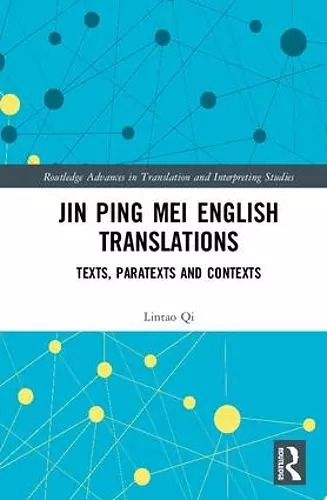Jin Ping Mei English Translations
Texts, Paratexts and Contexts
Format:Hardback
Publisher:Taylor & Francis Ltd
Published:29th May '18
Currently unavailable, and unfortunately no date known when it will be back
This hardback is available in another edition too:
- Paperback£44.99(9780367892975)

This book investigates the English translations and adaptations of the sixteenth century classic Chinese novel Jin Ping Mei. Acclaimed the ‘No.1 Marvellous Book’ of the Ming dynasty, Jin Ping Mei was banned soon after its appearance, due to the inclusion of graphically explicit sexual descriptions. So far there have been more than a dozen English adaptations and translations of the novel.
Working within the framework of descriptive translation studies, this book provides a translational history of the English versions of Jin Ping Mei, supported by various paratexts, including book covers, reviews, and archival materials. It also conducts textual comparisons to uncover the translation norms at work in the only two complete renditions, namely The Golden Lotus by Clement Egerton and The Plum in the Golden Vase by David Roy, respectively. The notions of agency, habitus and capital are introduced for the examination of the transference of linguistic, literary and cultural aspects of the two translations.
The book represents the first systematic research effort on the English Translations of Jin Ping Mei. Given its pioneering status and interdisciplinary nature, the data, structure and findings of this book will potentially enrich the fields of Translation Studies, Comparative Literature, Chinese Studies, Cultural Studies and Book History.
'This is a strong work that makes good on its promises, is built on a firm foundation, and is well organized. As claimed in the work, it is the first sustained examination of the history of the translation of this novel into English and the first systematic and well-informed comparison of the two most complete translations. Some very interesting research has been done as part of the project (for instance, the results of the examination of the Routledge archive clear up many questions about the Egerton translation and careful interviewing of Roy manages to flesh out his work on the novel in a more complete way than has been done in the past). The novel itself is very important and the questions that came up in the process of the many attempts to make it circulate in an English form bring up many interesting questions that are dealt with in depth and with great sophistication in this work. The author comes up with many judicious conclusions, many of which have larger resonance than this particular case study.'— David Rolston, Associate Professor of Chinese Literature, Asian Language and Cultures, University of Michigan
'Lintao Qi’s book examines a fascinating example of a text that has been censored and self-censored in translation. It is particularly original in its use of archival sources and interviews to uncover the process of translation, adaptation and retranslation of this classic work.' — Jeremy Munday, Professor of Translation Studies, Centre for Translation Studies, University of Leeds
'This is a strong work that makes good on its promises, is built on a firm foundation, and is well organized. As claimed in the work, it is the first sustained examination of the history of the translation of this novel into English and the first systematic and well-informed comparison of the two most complete translations. Some very interesting research has been done as part of the project (for instance, the results of the examination of the Routledge archive clear up many questions about the Egerton translation and careful interviewing of Roy manages to flesh out his work on the novel in a more complete way than has been done in the past). The novel itself is very important and the questions that came up in the process of the many attempts to make it circulate in an English form bring up many interesting questions that are dealt with in depth and with great sophistication in this work. The author comes up with many judicious conclusions, many of which have larger resonance than this particular case study.'— David Rolston, Associate Professor of Chinese Literature, Asian Language and Cultures, University of Michigan
'Lintao Qi’s book examines a fascinating example of a text that has been censored and self-censored in translation. It is particularly original in its use of archival sources and interviews to uncover the process of translation, adaptation and retranslation of this classic work.' — Jeremy Munday, Professor of Translation Studies, Centre for Translation Studies, University of Leeds
ISBN: 9781138481152
Dimensions: unknown
Weight: 453g
222 pages